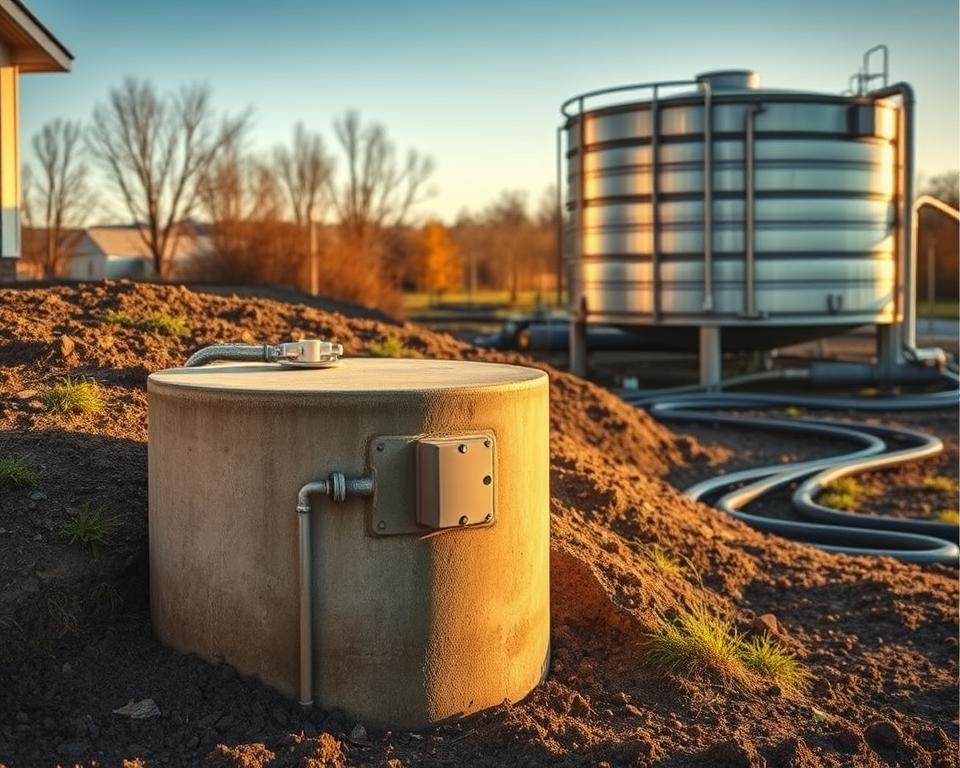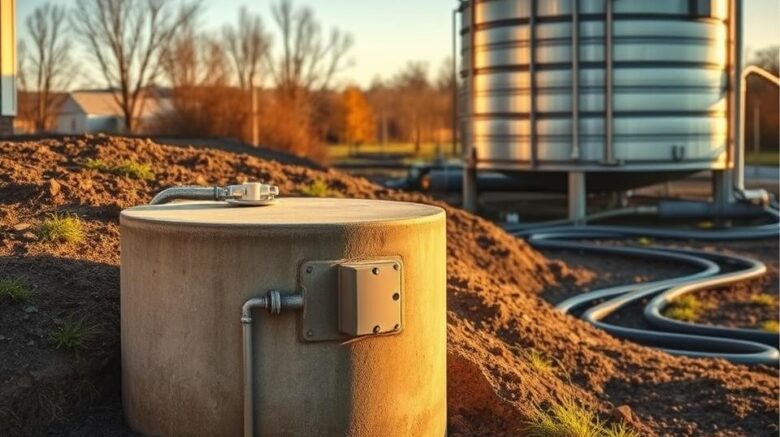Pumping Your Septic System
Ever pondered how often you should set up septic system pumping to avert hefty breakdowns? With over 20 percent of U.S. households depending on septic systems, grasping their maintenance is crucial. Pinpointing the right time to plan a septic tank service is paramount to its lifespan. Additionally, you can find budget-friendly septic pumping services that deliver excellent functionality minus the big price tag. This guide covers essential upkeep tips helpful for every homeowner.
Essential Insights
- Scheduled septic system pumping is vital for smooth performance.
- Recognizing the indicators that signal the need for service can head off major issues.
- Selecting professional septic system pumpers guarantees quality maintenance.
- Cost-effective septic pumping choices are accessible for homeowners.
- Periodic inspections contribute to optimal system performance.
Getting to Know Your Septic System
A septic system serves a vital role in managing household wastewater, consisting of several essential components that work collectively. The main drain line carries wastewater from your home to the septic tank, where the process starts. In the tank, an underground chamber, solids settle at the bottom, and bacteria digest these solids, processing the waste thoroughly.
The treated liquid effluent next flows from the septic tank to the distribution box, where it is spread evenly across the drain field or leach field. Here, the soil extends the filtration, further purify the wastewater. Understanding the functions of these septic system parts is essential. It empowers homeowners to supervise and upkeep their systems effectively.
Being aware of how your septic system functions lets you adopt preventive maintenance measures. It’s beneficial to have scheduled meetings with professional service providers of septic systems – septic tank pumping service near me. They offer crucial insights for optimal performance of your system. These specialists assist in scheduling the essential pump-outs and checks. This attentiveness can significantly prolong your septic system’s lifespan.
Importance of Septic System Maintenance
Keeping your septic tank consistently is key for homeowners who wish their system to last. A well-cared-for system delivers peace of mind and secures your property’s value. Without appropriate care, you’re exposing yourself to system breakdowns and health dangers.
Opting for a top-notch septic pumping service is important. They offer timely inspections and pump-outs, extracting sludge and scum buildup. If maintenance is ignored, emergency pumping may be required, which is costly.
Sticking to a consistent maintenance plan is smart. It includes professional evaluations and regular pumping. This preventive measure heads off urgent issues, creating a safer living environment for everyone.

How to Tell Your Septic System Requires Service
Staying mindful of septic system issues can sidestep costly repairs and major damage. Typical signs indicate when your system demands a check. These include:
- Sluggish drains throughout the house
- Pooling water in the yard above the drain field
- Foul odors near the septic tank or leach field
- Remarkably lush grass growth in specific areas of your yard
These clues could point to problems that might cause your system failing. Swift intervention is vital. Reaching out to septic pumping specialists for an inspection assists. Prompt response stops minor issues from turning into major ones. Plus, consistent upkeep secures your system operates well and has a longer life.
Best Practices for Septic System Pumping
Proper pumping of your septic tank is crucial to prevent expensive clogs and backups. It’s vital to establish the appropriate schedule for maintenance. Homeowners should usually arrange pumping every 2 to 5 years, subject to the tank’s size and household wastewater levels. Frequent use of garbage disposals may require more frequent pumping.
Engaging experienced pumpers means your tank gets a thorough clean and check-up. During pumping, technicians look for any issues, such as faulty baffles. Detecting these problems early heads off larger expenses and inconveniences later. Routine pumping schedules and expert help ensure your septic system’s efficient operation.
Regular Inspections Keep Your Septic System Running
Periodic inspections are vital for your septic system’s performance. Septic system inspections uncover minor issues before they grow. Professionals advise inspections every three to five years, depending on system size and household usage. This prevents costly fixes.
Keeping maintenance records is crucial for documenting your system’s condition. These records offer insights into previous inspections, repairs, and suitable intervals to schedule septic tank cleaning services. With this information, organizing for future upkeep becomes more straightforward, maintaining septic systems in prime shape.
Frequent inspections and detailed record-keeping not only improve system efficiency but also prolong its life. This method secures the environment and the investment in a safe, operational home.
| Inspection Type | Recommendation Frequency | Benefits |
|---|---|---|
| Visual Inspection | Annually | Identify surface issues |
| Professional Inspection | Every 3–5 years | Assess functionality and detect problems |
| Septic Tank Pumping | Every 3–6 years | Prevent overflow and system failure |
Efficient Water Usage to Extend Septic Life
Efficient water use is crucial for keeping your septic system healthy. It not only helps the environment but also enhances the performance of your home’s plumbing. By practicing easy, yet effective, conservation methods, homeowners can reduce wastewater.
Space out your laundry activities over the week instead of doing them all at once. This enables the septic system to handle water better and prevents tank overflow. Choosing low-flow fixtures in your kitchens and bathrooms leads to considerable water savings, keeping the water pressure up while cutting the flow rate, thus trimming the amount of wastewater produced each day.
Swiftly fixing leaks is another way to help your septic system. Even a small leak can result in a large waste of water, overburdening the septic system. Through regular inspections and repairs, you contribute significantly to the system’s efficiency.
Emphasizing water conservation isn’t just advantageous for your septic system; it’s also a step towards sustainable living. Making such practices into your daily routine serves both your household and the planet.
Managing Household Waste Correctly
Homeowners carry a crucial role in keeping their septic system’s health by handling household waste appropriately. It’s essential to avoid disposing of non-biodegradable items like wipes, plastics, and other hazardous products in the system. These items can cause clogs, resulting in costly repairs and a drop in efficiency.
Recycling food scraps and organic materials is a advantageous alternative to disposing of them conventionally. This practice markedly reduces the amount of solid waste entering the septic tank. Emphasizing biodegradable waste disposal supports the ecological balance needed for effective waste management.
It’s vital to keep an eye on what goes down the drains. Non-decomposable items can necessitate more frequent septic tank pumping. By learning and observing correct waste disposal methods, you can secure a more efficient and long-lasting septic system.
Choosing Septic-Friendly Cleaners
The health of your septic system is heavily influenced by your choice of cleaning products. Using septic-safe cleaning products is paramount. These products protect the balance of beneficial bacteria that digest waste. Many standard cleaners include harmful chemicals that jeopardize this balance, resulting in pricey repairs or system failure.
Homeowners should consider natural alternatives that are both efficient and environmentally friendly. Common household items like baking soda, vinegar, and lemon juice are superb choices. These natural cleaners are not only capable but also maintain your septic system’s health.
Keeping away from products that contain antibacterial agents and chlorine bleach is crucial. Such substances damage the essential good bacteria, undermining your system’s functionality. By choosing sustainable products, you secure both the efficiency and longevity of your septic system.
Why Bacteria Matter in Septic Systems
Bacteria carry out a critical role in keeping your septic system efficient. They break down solids on their own and boost nutrient processing. A lack of healthy bacteria can cause system failure, resulting in hefty repairs.
Homeowners can enhance their system by adding organic additives. These products boost beneficial bacteria, making waste decomposition more effective. It’s important to opt for organic additives that are beneficial, not harmful, to the septic environment.
A healthy bacterial community is key to a septic system’s longevity and efficiency. It prevents solid buildup and reduces the need for frequent pumping. Emphasizing bacterial health makes waste management more effective and eco-friendly.
Bringing It All Together
Septic system care is vital for the life and functionality of your home’s wastewater system. Following key maintenance tips prevents costly repairs. Knowing routine pumping and inspections is fundamental. This secures your septic system stays in excellent condition.
Educating yourself on your septic system’s operation and proper methods in water and waste management is vital. Engaging professionals like All in Sanitation provides expertise. This supports your septic system’s long-term health and gives peace of mind.
Investing in proper septic maintenance today brings future benefits. It shields your home and boosts your family’s quality of life. Prioritizing septic system care delivers assurance with a well-maintained system.
